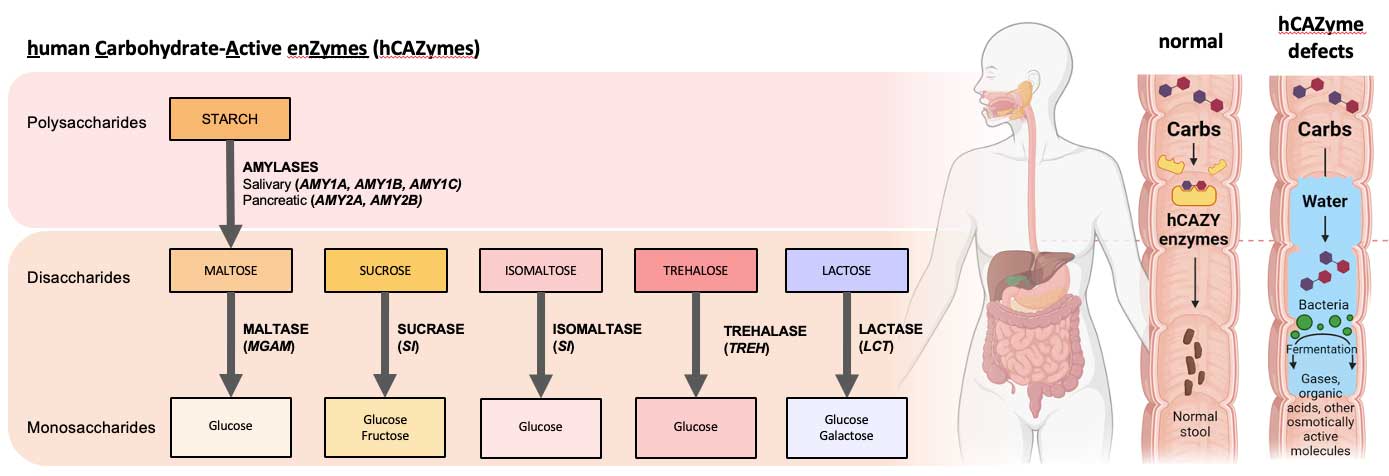
2024/07/09
Genetic defects in carbohydrate digestion behind irritable bowel syndrome
One in ten people suffer from irritable bowel syndrome (IBS), but therapeutic options are few and generally limited in efficacy because of the unknown aetiology.
A new study, published in the journal Gut, adds further evidence that genetic defects in enzymes digesting carbohydrates can contribute to IBS.
Irritable bowel syndrome (IBS) is a highly prevalent gastrointestinal disorder that affects around 10-15% of the global population. Common IBS symptoms include abdominal pain, bloating, diarrhea, and constipation. Although the causes of IBS remain elusive, a significant number of individuals link the appearance of their symptoms to the ingestion of carbohydrates, and their dietary elimination or controlled reduction appears to be beneficial, at least in some patients.
Researchers at CIC bioGUNE, member of BRTA, now report in the journal Gut that DNA changes in genes involved in carbohydrate digestion predispose to IBS.
The international team, led by Ikerbasque Professor Mauro D’Amato from the Gastrointestinal Genetics Research group at CIC bioGUNE and LUM University, studied a series of enzymes responsible for the breakdown of dietary carbohydrates (called CAZymes), and showed that genetic variations in the corresponding genes can affect an individual’s risk of developing IBS. They had previously reported that genetic defects in the sucrase-isomaltase (SI, an enzyme that digests sucrose) increase the risk of IBS. Studying lifestyle, genetic and healthcare data in 366,432 individuals from the population-based cohort UK Biobank, they now provide similar evidence for two other CAZymes, the amylases AMY1B and AMY2A that digest starch.
“Maldigestion of sugars and/or starch due to dysfunctional CAZymes may lead to IBS symptoms because of their accumulation in the lower bowel where they are fermented by the gut microbiota causing bloating, gas, abdominal pain and diarrhea”, Professor D’Amato explains. “The specific genetic make-up of individual CAZyme genes may thus also account for why some people experience symptoms after consuming starchy or sucrose-rich foods while others don’t” he adds. This information may be strategically used to try and personalize dietary approaches to the management of IBS based on patients’ CAZyme genetic profiling; the authors conclude in their publication.
The study was supported by research funding to MD’A from: Grant PCI2021-122064-2A funded by MICIU/AEI/ 10.13039/501100011033 and, by the “European Union NextGenerationEU/PRTR under the umbrella of the European Joint Programming Initiative “A Healthy Diet for a Healthy Life” (JPI HDHL) and of the ERA-NET Cofund ERA-HDHL (GA N° 696295 of the EU Horizon 2020 Research and Innovation Programme); and Grant PID2020-113625RB-I00 funded by MICIU/AEI/ 10.13039/501100011033.
UK Biobank: UK Biobank is a large-scale biomedical database and research resource containing anonymised genetic, lifestyle and health information from half a million UK participants. UK Biobank’s database, which includes blood samples, heart and brain scans and genetic data of the volunteer participants, is globally accessible to approved researchers who are undertaking health-related research that’s in the public interest. UK Biobank’s resource was opened for research use in April 2012. Since then, 30,000 researchers from 100 countries have been approved to use it and more than 6,000 peer-reviewed papers that used the resource have now been published. You can find out more about UK Biobank at http://www.ukbiobank.ac.uk.
Reference: Leire Torices, Andreea Zamfir-Taranu, Cristina Esteban-Blanco, Isotta Bozzarelli, Ferdinando Bonfiglio, Mauro D’Amato. Human CAZyme genes polymorphism and risk of IBS: a population-based study. Gut. DOI:10.1136/gutjnl-2024-333056.
About CIC bioGUNE
The Centre for Cooperative Research in Biosciences (CIC bioGUNE), member of the Basque Research & Technology Alliance (BRTA), located in the Bizkaia Technology Park, is a biomedical research organisation conducting cutting-edge research at the interface between structural, molecular and cell biology, with a particular focus on generating knowledge on the molecular bases of disease, for use in the development of new diagnostic methods and advanced therapies.
About Ikerbasque
Ikerbasque- Basque Foundation for Science - is the result of an initiative of the Department of Education of the Basque Government that aims to reinforce the commitment to scientific research by attracting, recovering and consolidating excellent researchers from all over the world. Currently, it is a consolidated organization that has 290 researchers/s, who develop their work in all fields of knowledge.
About BRTA
BRTA is an alliance of 4 collaborative research centres (CIC bioGUNE, CIC nanoGUNE, CIC biomaGUNE y CIC energiGUNE) and 13 technology centres (Azterlan, Azti, Ceit, Cidetec, Gaiker, Ideko, Ikerlan, Leartiker, Lortek, Neiker, Tecnalia, Tekniker y Vicomtech) with the main objective of developing advanced technological solutions for the Basque corporate fabric.
With the support of the Basque Government, the SPRI Group and the Provincial Councils of the three territories, the alliance seeks to promote collaboration between the research centres, strengthen the conditions to generate and transfer knowledge to companies, contributing to their competitiveness and outspreading the Basque scientific-technological capacity abroad.
BRTA has a workforce of 3,500 professionals, executes 22% of the Basque Country's R&D investment, registers an annual turnover of more than 300 million euros and generates 100 European and international patents per year.


See a large version of the first picture


